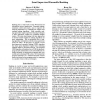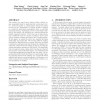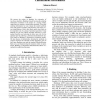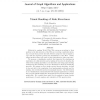AAAI
2008
14 years 2 months ago
2008
Ranking plays a central role in many Web search and information retrieval applications. Ensemble ranking, sometimes called meta-search, aims to improve the retrieval performance b...
CVPR
2009
IEEE
14 years 4 months ago
2009
IEEE
Ranking large scale image and video collections usually expects higher accuracy on top ranked data, while tolerates lower accuracy on bottom ranked ones. In view of this, we propo...
SIGIR
2010
ACM
14 years 4 months ago
2010
ACM
The context of a search query often provides a search engine meaningful hints for answering the current query better. Previous studies on context-aware search were either focused ...
SIGIR
2010
ACM
14 years 4 months ago
2010
ACM
Ranking search results is a fundamental problem in information retrieval. In this paper we explore whether the use of proximity and phrase information can improve web retrieval ac...
KDD
1998
ACM
14 years 4 months ago
1998
ACM
We present the notion of Ranking for evaluation of two-class classifiers. Ranking is based on using the ordering information contained in the output of a scoring model, rather tha...
ICDE
2010
IEEE
14 years 4 months ago
2010
IEEE
Mashups are situational applications that build data flows to link the contents of multiple Web sources. Often times, ranking the results of a mashup is handled in a materializethe...
WADS
2001
Springer
14 years 4 months ago
2001
Springer
Methods for ranking World Wide Web resources according to their position in the link structure of the Web are receiving considerable attention, because they provide the first e�...
WSDM
2010
ACM
14 years 5 months ago
2010
ACM
Ranking a set of retrieved documents according to their relevance to a given query has become a popular problem at the intersection of web search, machine learning, and informatio...
WEBDB
2004
Springer
14 years 5 months ago
2004
Springer
Rooted in electronic publishing, XML is now widely used for modelling and storing structured text documents. Especially in the WWW, retrieval of XML documents is most useful in co...
VLDB
2004
ACM
14 years 5 months ago
2004
ACM
We investigate the problem of ranking answers to a database query when many tuples are returned. We adapt and apply principles of probabilistic models from Information Retrieval f...




